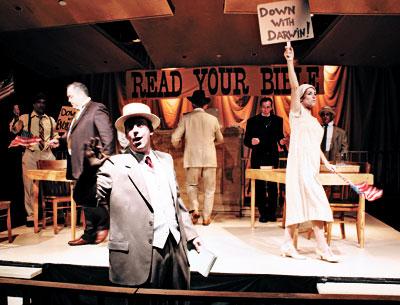Opinion: ‘Inherit the Wind’

“Inherit the Wind,” a play based on the 1925 Scopes Monkey Trial and written in the 1950s in reaction to McCarthyism, has vital resonance for our own era, particularly on the eve of a national election. The tight and well-acted production by Michael Disher for Center Stage at the Southampton Cultural Center is well worth seeing, not only as a diversion but for its underlying message.
Almost a century after John T. Scopes agreed to serve as a test case for a Tennessee law banning the teaching of evolution in schools, school battles over creationism and evolution continue in many states. This is not a play about that. Rather, the playwrights chose the trial as a way to ground a broader examination of the theme of intellectual freedom, striking a final note of conciliation rather than an overall indictment of faith over reason. The play implies that neither need be adhered to over the other, as we should be free in this country to decide for ourselves what is right.
Mr. Disher’s full productions always rise to the challenge of working with very little. His preference for staging plays rather than doing readings continually offers instruction in just how much can be accomplished with the mere suggestion of sights, sounds, clothing, and props.
His minimalist sets on the small stage continually capture the essence of the milieu and allow the audience to enter the scene and fill in the blanks as they see fit. His costumes, even when just alluding to the fashion of the period, add to the credibility of the staging. Here, a couple of tables, chairs, and a raised platform can serve triple duty as meeting house, church, and courtroom, the outdoors suggested by the theater’s aisles. Music often serves as another element of setting and Mr. Disher’s choice of introduction, interlude, and sometimes concluding songs contribute much to the mood of the piece.
His actors, while all community-based, often rise to the level of professionals, if not already professionals themselves. This cast hits all the right notes, with particularly memorable performances by Alan Stewart, Doug Walter, Jack Seabury, and Amanda Stein.
Mr. Stewart plays Matthew Harrison Brady, the character based on Williams Jennings Bryan, a populist who argued in favor of the Tennessee law. Daniel Becker plays Henry Drummond, based on Clarence Darrow in his defense of Scopes, who is alluded to in the role of Bertram Cates, played by Vincent Carbone.
Ms. Stein plays Rachel Brown, Bert’s vulnerable sweetheart, and Mr. Walter is her father, the firebrand Rev. Jeremiah Brown. Mr. Seabury is E.K. Hornbeck, the character based on H.L. Mencken, who reported on the trial. Hornbeck is the true atheist in the play. Drummond appears to be that lawyer who seizes on an issue more for the challenge and attention it attracts than as a matter of principle. In the end, he splits the difference.
They receive strong support from Terrence Fiore, Richard Gardini, Barbara Jo Howard, Deborah Marshall, Matthew Peraza, Tony Peraza, Philip Reichert, and Stephan Scheck.
This is topical and political theater, but illustrates how, even when diametrically opposed, two sides of a debate might be reconciled for the greater good of the whole. What is more important: evolution, creation, or the right to believe in one or the other? In an often bitterly partisan country, this is something worth being reminded of as we go to the polls in November.
